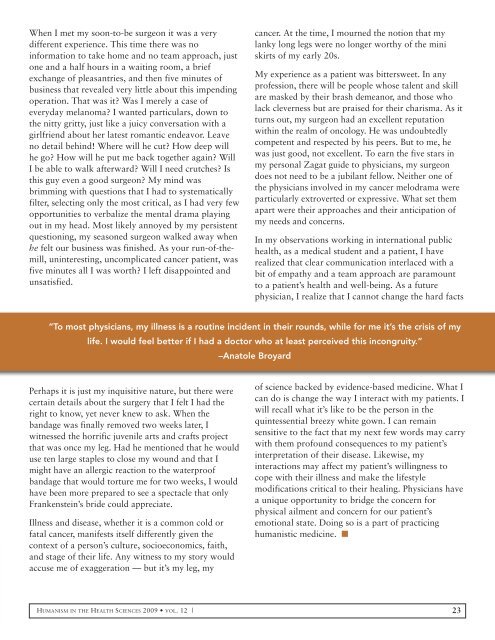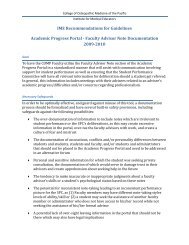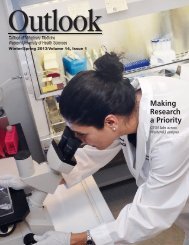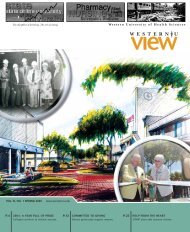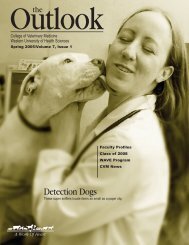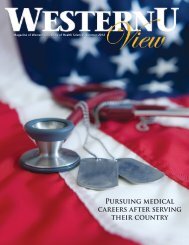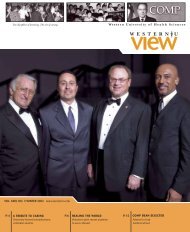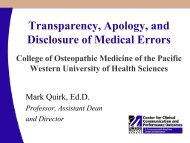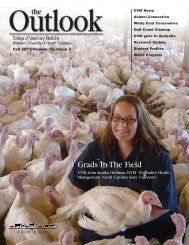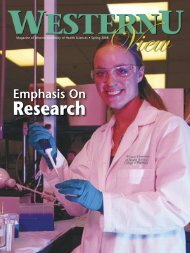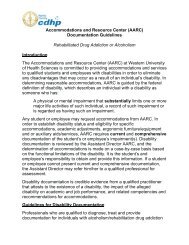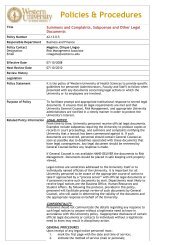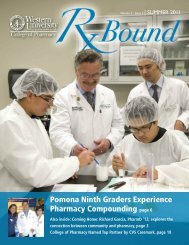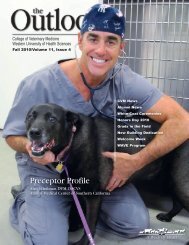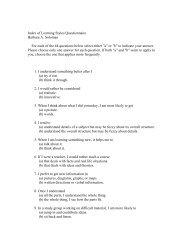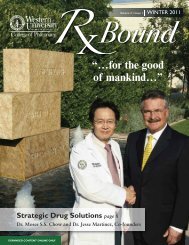Humanism 2009 - Western University of Health Sciences
Humanism 2009 - Western University of Health Sciences
Humanism 2009 - Western University of Health Sciences
Create successful ePaper yourself
Turn your PDF publications into a flip-book with our unique Google optimized e-Paper software.
When I met my soon-to-be surgeon it was a very<br />
different experience. This time there was no<br />
information to take home and no team approach, just<br />
one and a half hours in a waiting room, a brief<br />
exchange <strong>of</strong> pleasantries, and then five minutes <strong>of</strong><br />
business that revealed very little about this impending<br />
operation. That was it? Was I merely a case <strong>of</strong><br />
everyday melanoma? I wanted particulars, down to<br />
the nitty gritty, just like a juicy conversation with a<br />
girlfriend about her latest romantic endeavor. Leave<br />
no detail behind! Where will he cut? How deep will<br />
he go? How will he put me back together again? Will<br />
I be able to walk afterward? Will I need crutches? Is<br />
this guy even a good surgeon? My mind was<br />
brimming with questions that I had to systematically<br />
filter, selecting only the most critical, as I had very few<br />
opportunities to verbalize the mental drama playing<br />
out in my head. Most likely annoyed by my persistent<br />
questioning, my seasoned surgeon walked away when<br />
he felt our business was finished. As your run-<strong>of</strong>-themill,<br />
uninteresting, uncomplicated cancer patient, was<br />
five minutes all I was worth? I left disappointed and<br />
unsatisfied.<br />
Perhaps it is just my inquisitive nature, but there were<br />
certain details about the surgery that I felt I had the<br />
right to know, yet never knew to ask. When the<br />
bandage was finally removed two weeks later, I<br />
witnessed the horrific juvenile arts and crafts project<br />
that was once my leg. Had he mentioned that he would<br />
use ten large staples to close my wound and that I<br />
might have an allergic reaction to the waterpro<strong>of</strong><br />
bandage that would torture me for two weeks, I would<br />
have been more prepared to see a spectacle that only<br />
Frankenstein’s bride could appreciate.<br />
Illness and disease, whether it is a common cold or<br />
fatal cancer, manifests itself differently given the<br />
context <strong>of</strong> a person’s culture, socioeconomics, faith,<br />
and stage <strong>of</strong> their life. Any witness to my story would<br />
accuse me <strong>of</strong> exaggeration — but it’s my leg, my<br />
cancer. At the time, I mourned the notion that my<br />
lanky long legs were no longer worthy <strong>of</strong> the mini<br />
skirts <strong>of</strong> my early 20s.<br />
My experience as a patient was bittersweet. In any<br />
pr<strong>of</strong>ession, there will be people whose talent and skill<br />
are masked by their brash demeanor, and those who<br />
lack cleverness but are praised for their charisma. As it<br />
turns out, my surgeon had an excellent reputation<br />
within the realm <strong>of</strong> oncology. He was undoubtedly<br />
competent and respected by his peers. But to me, he<br />
was just good, not excellent. To earn the five stars in<br />
my personal Zagat guide to physicians, my surgeon<br />
does not need to be a jubilant fellow. Neither one <strong>of</strong><br />
the physicians involved in my cancer melodrama were<br />
particularly extroverted or expressive. What set them<br />
apart were their approaches and their anticipation <strong>of</strong><br />
my needs and concerns.<br />
In my observations working in international public<br />
health, as a medical student and a patient, I have<br />
realized that clear communication interlaced with a<br />
bit <strong>of</strong> empathy and a team approach are paramount<br />
to a patient’s health and well-being. As a future<br />
physician, I realize that I cannot change the hard facts<br />
“To most physicians, my illness is a routine incident in their rounds, while for me it’s the crisis <strong>of</strong> my<br />
life. I would feel better if I had a doctor who at least perceived this incongruity.”<br />
–Anatole Broyard<br />
<strong>of</strong> science backed by evidence-based medicine. What I<br />
can do is change the way I interact with my patients. I<br />
will recall what it’s like to be the person in the<br />
quintessential breezy white gown. I can remain<br />
sensitive to the fact that my next few words may carry<br />
with them pr<strong>of</strong>ound consequences to my patient’s<br />
interpretation <strong>of</strong> their disease. Likewise, my<br />
interactions may affect my patient’s willingness to<br />
cope with their illness and make the lifestyle<br />
modifications critical to their healing. Physicians have<br />
a unique opportunity to bridge the concern for<br />
physical ailment and concern for our patient’s<br />
emotional state. Doing so is a part <strong>of</strong> practicing<br />
humanistic medicine. ■<br />
HUMANISM IN THE HEALTH SCIENCES <strong>2009</strong> • VOL. 12 | 23


